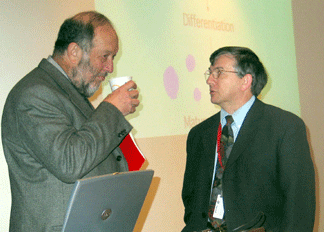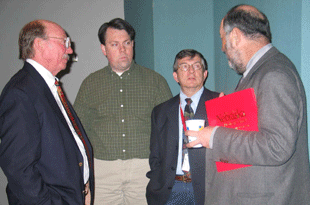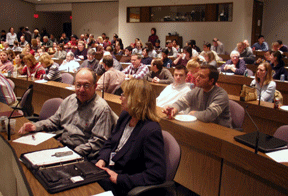 |
Before his presentation, Dr. Weissman converses with David Crouse, Ph.D. associate vice chancellor for academic affairs at UNMC. |
Irving Weissman, M.D., director of the Institute of Cancer/Stem Cell Biology and Medicine at Stanford University, discussed the promise of stem cell research Thursday with an overflow crowd at the Eppley Science Hall Amphitheater. His visit to UNMC was co-sponsored by the UNMC Graduate Student Association and Nebraskans for Research.
“Dr. Weissman has become the national champion of stem cell research,” said Jim Turpen, Ph.D., professor and vice chairman of the department of genetics, cell biology and anatomy, and principal investigator of NE-BRIN. “His vision for the therapeutic potential of stem cells, his scientific leadership in this field, and his eloquent advocacy for continuation of this research in the arena of public policy, will have a profound impact on society for generations to come.”
 |
Dr. Weissman, far right, talks with, from left, James Turpen, Ph.D., professor of genetics, cell biology and anatomy; Robert Arpke, president of the Graduate Student Association (GSA); and David Crouse, Ph.D., associate vice chancellor for academic affairs. The GSA hosted Dr. Weissman’s presentation at UNMC. |
“It would allow us to understand how defects of certain genes lead to certain known human diseases,” Dr. Weissman said. Once that is known, researchers could ask which of the genes that are implicated in the disease play a causative role in the disease, or pathogenesis.
Passing legislation against all forms of cloning would “ban the most promising new technology applicable to a very large fraction of human disease,” he said.
 |
An overflow crowd heard the presentation of Irving Weissman, M.D., director of the Institute of Cancer/Stem Cell Biology and Medicine at Stanford. |
“If the state of Nebraska, specifically, would ban that form of therapeutic and basic research but the state of California lets it go forward, then let’s say we make cell lines which are from and cause Lou Gehrig’s disease, multiple sclerosis, Type 1 or Type 2 diabetes, early onset heart attack, stroke or any of those cell lines, medical scientists in Nebraska would not be allowed to work on it. Where would those scientists go to work on it? And where would the patients benefit from those therapies?”
In 1988, Dr. Weissman’s lab was the first to isolate the hematopoietic stem cell, the cell type that forms all other blood cells, from mice. In 1992, Dr. Weissman isolated the hematopoietic stem cell in humans also, and its discovery has opened new avenues for research and treatment of many different kinds of cancers.
Stem cells are important because they can produce many different types of specialized cells instead of just replicating themselves like most cells do.
During his presentation, Dr. Weissman said his own research could not confirm the theory that adult stem cells can become other cell types in the body, casting doubt on whether these observations by some other scientists can be generalized. His research has shown that the cells found in other tissues are often the result of cell fusion between the transplanted stem cell and the cells already present in the recipient.
Dr. Weissman urged scientists, students and the public to ask three questions in determining whether a “discovery” is a scientifically acceptable fact:
- Has it been published in a peer-reviewed journal?
- Has the science been replicated in independent laboratories?
- Is the phenomenon that’s discovered so powerful that any way you go at it, it’s true?
“That is not just stem cells,” Dr. Weissman said. “Think of cold fusion in Utah some eight or 10 years ago. One laboratory did it, no other laboratory could replicate it and any way you went at it, it wasn’t true. If you ask those three questions that will be a guide. You should always ask the people who make the claim.”
Dr. Weissman said research in his lab and elsewhere suggests that in some cancers, such as leukemia, the cancer cells grow and proliferate in much the same way as stem cells. Basic and clinical scientists at the Stanford Institute are using stem cell biology and cancer biology to develop new cancer treatments, as well as treatments for illnesses such as diabetes, Parkinson’s disease and cardiovascular disease, he said.
“What we’re doing is examining these two fields that we thought were separate and looking at the overlap that exists between them,” he said. In addition, they have focused on the purification, biology, transplantation and evolution of stem cells.